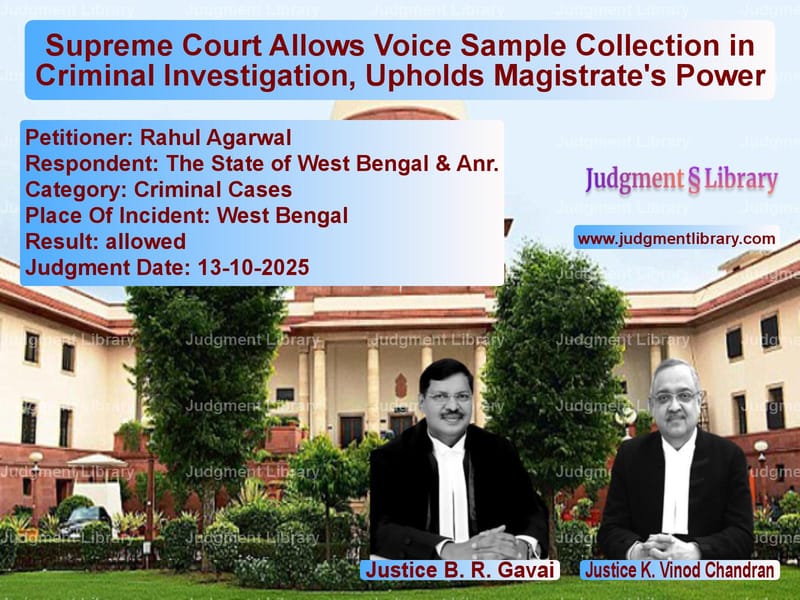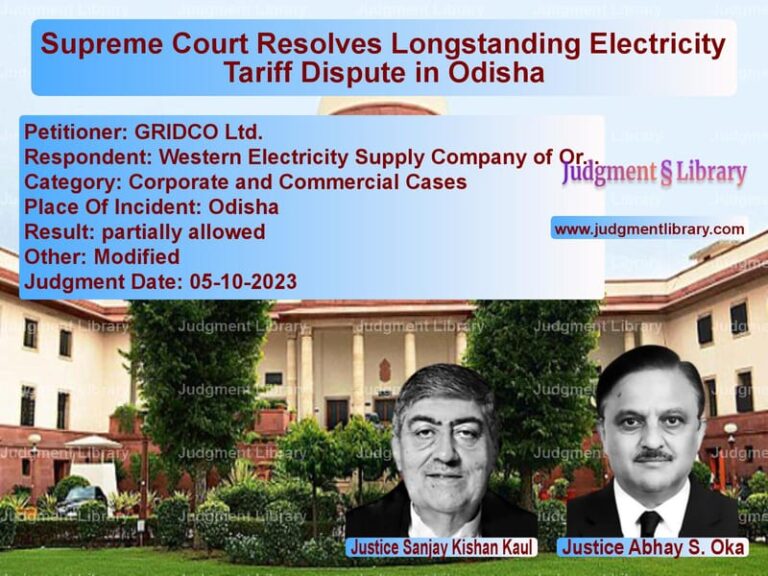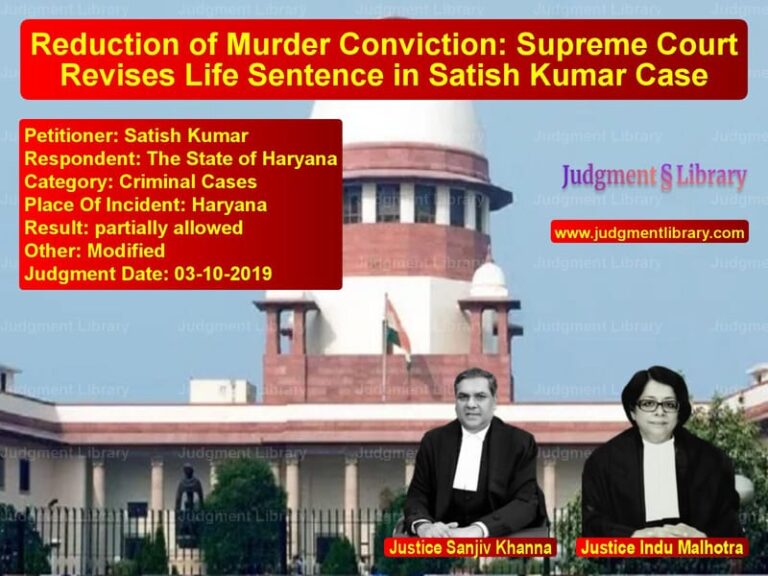Supreme Court Allows Voice Sample Collection in Criminal Investigation, Upholds Magistrate’s Power
In a significant judgment that reinforces the powers of investigative authorities while balancing constitutional protections, the Supreme Court of India has ruled that magistrates can order individuals to provide voice samples for criminal investigations, even when the person is not formally an accused but a witness who might later face charges. The judgment, delivered on October 13, 2025, settles an important legal question about the intersection of modern investigative techniques and constitutional rights against self-incrimination.
The case originated from a tragic incident where a 25-year-old married woman died on February 16, 2021, leading to allegations of harassment and torture at her matrimonial home. The investigation took a complex turn when counter-allegations emerged that the deceased, along with her parents, had misappropriated cash and jewelry belonging to the husband’s family. A cousin of the husband filed a police complaint naming the deceased’s parents as accused.
During the investigation, the Investigating Officer received information that the second respondent had acted as an agent for the deceased’s father and had threatened a witness. The witness claimed to have knowledge about an extortion demand made by the father through the second respondent. To verify these claims, the Investigating Officer sought to collect the second respondent’s voice sample for comparison with recorded evidence.
The jurisdictional magistrate granted permission for voice sample collection through an order dated as Annexure P13. However, the second respondent challenged this order before the High Court, which set aside the magistrate’s order. The High Court justified its decision by noting that a similar question had been referred to a larger Supreme Court bench. This prompted the appellant to approach the Supreme Court, arguing that the reference had since been closed.
The Constitutional Question
The core legal issue revolved around whether compelling a person to provide a voice sample violates Article 20(3) of the Indian Constitution, which states that “no person accused of any offense shall be compelled to be a witness against himself.” The respondent’s counsel argued vehemently that the order was passed when the Criminal Procedure Code (Cr.P.C.) was in force, and while Section 349 of the Bhartiya Nagarik Suraksha Sanhita (BNSS), 2023 empowered magistrates to order voice samples, the Cr.P.C. contained no such provision.
The Supreme Court, however, found this to be a “purely academic question covered by a binding precedent” and criticized the High Court for “unnecessarily” agitating the issue and “egregiously” entertaining the challenge. The Court noted that the High Court had refused to follow binding Supreme Court precedent on the ground that there was a reference to a larger bench, even though that reference had been “closed unceremoniously, on default.”
The Precedent: Ritesh Sinha Case
The Supreme Court extensively relied on its landmark 2019 judgment in Ritesh Sinha v. State of Uttar Pradesh & Anr., which had addressed the identical question of voice sample collection. In that case, the Court was concerned with a conversation between two accused who allegedly collected money from people by promising jobs that never materialized.
The Court in Ritesh Sinha had built upon the foundational precedent in State of Bombay v. Kathi Kalu Oghad, where the Court had considered the self-incrimination plea regarding providing specimen handwriting, signatures, or finger impressions. The Kathi Kalu Oghad judgment had established crucial principles that the Supreme Court now applied to voice samples.
The Court quoted extensively from Kathi Kalu Oghad: “In order that a testimony by an accused person may be said to have been self-incriminatory, the compulsion of which comes within the prohibition of the constitutional provision, it must be of such a character that by itself it should have the tendency of incriminating the accused, if not also of actually doing so. In other words, it should be a statement which makes the case against the accused person at least probable, considered by itself. A specimen handwriting or signature or finger impressions by themselves are no testimony at all, being wholly innocuous… They are only materials for comparison in order to lend assurance to the Court that its inference based on other pieces of evidence is reliable. They are neither oral nor documentary evidence but belong to the third category of material evidence which is outside the limit of ‘testimony’.”
The judgment further clarified: “It has to be noticed that Article 20(3) of our Constitution does not say that an accused person shall not be compelled to be a witness. It says that such a person shall not be compelled to be a witness against himself. The question that arises therefore is: Is an accused person furnishing evidence against himself, when he gives his specimen handwriting, or impressions of his fingers, palm or foot? The answer to this must, in our opinion, be in the negative.”
Application to Voice Samples
The Supreme Court noted that following these precedents, the Ritesh Sinha case had held that “despite absence of explicit provisions in Cr.P.C., a Judicial Magistrate must be conceded the power to order a person, to give a sample of his voice for the purpose of investigation for a crime.” The Court specifically emphasized that the Ritesh Sinha judgment had “not spoken only of the accused and specifically employed the words ‘a person’, consciously because the Rule against self-incrimination applies equally to any person whether he be an accused or a witness.”
This distinction proved crucial in the current case, as the second respondent was technically a witness at the time, though the investigation could potentially lead to him being arrayed as an accused. The Court clarified that “the Rule against self-incrimination applies equally to any person whether he be an accused or a witness.”
The Ritesh Sinha judgment had also directed that “till explicit provisions are incorporated in the Cr.P.C., the Judicial Magistrate will be so empowered by virtue of the said judgment.” The Court noted that this issue had been pending with the government and that with the advent of the BNSS, it had been specifically incorporated under Section 349.
Legal Framework Analysis
The Supreme Court provided a comprehensive analysis of the applicable legal framework: “We need not hence consider the question as to whether it is the Cr.P.C. or the BNSS which would be applicable to the present case. If it is the Cr.P.C., the three Judge Bench decision in Ritesh Sinha permits the same on the identical principle adopted by this Court in Kathi Kalu Oghad to permit furnishing of handwriting, signature and finger impressions. The said sampling is similar to voice sampling, as now possible by reason of the advancing technology. If it is the BNSS that is applicable, then there is a specific provision enabling such sampling.”
The Court reinforced the reasoning that “mere furnishing of a sample of the fingerprint, signature or handwriting would not incriminate the person as such. It would have to be compared with the material discovered on investigation, which alone could incriminate the person giving the sample, which would not fall under a testimonial compulsion, thus not falling foul of the rule against self-incrimination.”
Final Ruling and Implications
The Supreme Court allowed the appeal, setting aside the High Court’s order and restoring the magistrate’s directive for voice sample collection. The Court directed that “the 2nd respondent shall act in accordance with the order passed by the Magistrate.”
This judgment has far-reaching implications for criminal investigations in India. It reaffirms that voice samples, like fingerprints and handwriting specimens, constitute physical evidence rather than testimonial evidence, and therefore fall outside the scope of protection under Article 20(3) of the Constitution. The ruling empowers investigating agencies to utilize modern technological tools while ensuring that constitutional safeguards remain intact.
The decision also underscores the importance of following binding precedents and clarifies that lower courts cannot ignore Supreme Court judgments based on pending references that have since been resolved. By bridging the gap between traditional investigative methods and modern technological capabilities, the judgment ensures that the Indian criminal justice system can effectively address contemporary challenges while maintaining its constitutional foundations.
This ruling represents a significant step in adapting legal principles to technological advancements, ensuring that investigative techniques keep pace with modern capabilities while respecting fundamental rights. It provides much-needed clarity to investigating agencies, magistrates, and courts across the country on the permissibility and procedure for collecting voice samples in criminal investigations.
Petitioner Name: Rahul Agarwal.Respondent Name: The State of West Bengal & Anr..Judgment By: Justice B. R. Gavai, Justice K. Vinod Chandran.Place Of Incident: West Bengal.Judgment Date: 13-10-2025.Result: allowed.
Don’t miss out on the full details! Download the complete judgment in PDF format below and gain valuable insights instantly!
Download Judgment: rahul-agarwal-vs-the-state-of-west-be-supreme-court-of-india-judgment-dated-13-10-2025.pdf
Directly Download Judgment: Directly download this Judgment
See all petitions in Judgment by B R Gavai
See all petitions in Judgment by K. Vinod Chandran
See all petitions in allowed
See all petitions in supreme court of India judgments October 2025
See all petitions in 2025 judgments
See all posts in Criminal Cases Category
See all allowed petitions in Criminal Cases Category
See all Dismissed petitions in Criminal Cases Category
See all partially allowed petitions in Criminal Cases Category







